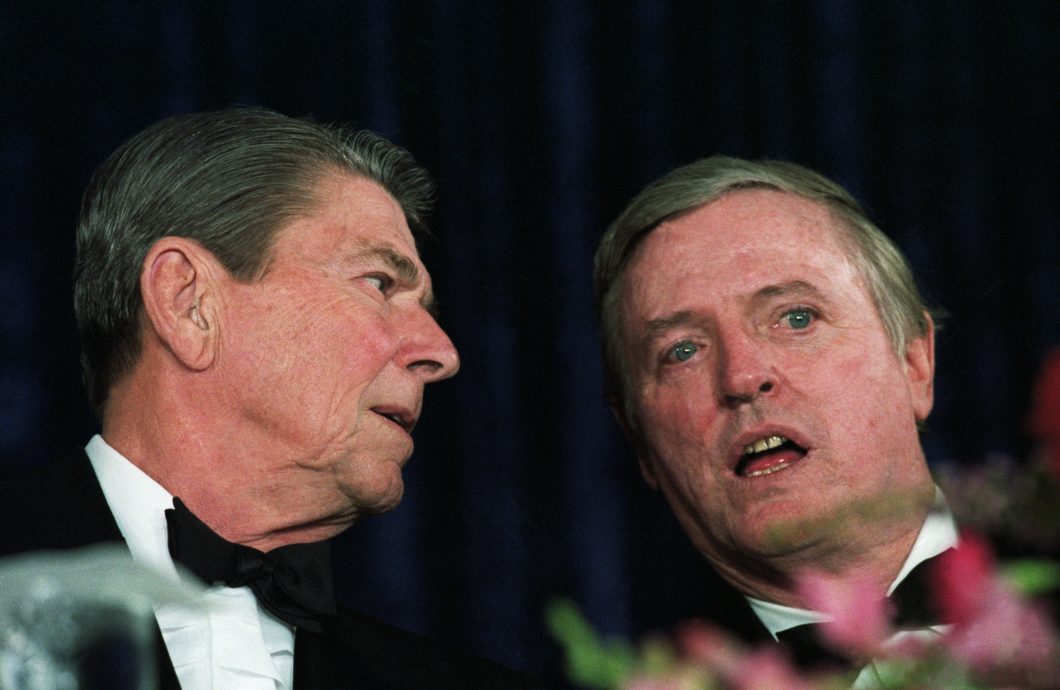Caldwell's Age of Entitlement argues that the civil rights state is the anvil upon which our nation wages its incessant political contests.
The Case for Zombie Reaganites
I’ve been waiting a long time for the Zombie-Reaganite apocalypse. I’m willing to donate my brain to the cause. Though I personally prefer plants, it seems clear that a horde of walking dead can sometimes be the best fix for a dysfunctional political party. Happily, a window to this option opened this summer with the release of the Freedom Conservatism Statement of Principles.
For the most part, this is a restatement of classically liberal principles that were once utterly uncontroversial among conservatives. Two or three decades ago, it would have felt ridiculous to lay these out in a dramatic, flag-planting gesture. Today it does not feel ridiculous, and though I am not personally acquainted with Avik Roy, or any of the statement’s key drafters, the point of the initiative seemed clear enough to me when I first read it last June. I was happy to sign, perceiving the statement as a welcome counterpoint to the arguments of “New Right” thinkers and intellectuals who have repeatedly assured us that the entire architecture of Reaganite or Buckley-style conservatism is structurally unsound, fit only for a wrecking ball. Many of us disagree. And though we’ve become fairly accustomed to being cast as the befuddled, out-of-touch straight men of the New Right narrative, we actually have some fairly substantive views of our own that our crusading neo-traditional brethren might do well to address. Maybe it’s finally time for some serious discussion of these matters that doesn’t sidestep critical questions with grandstanding speeches about “cuckservatives” and “market worshippers.”
Coming from this perspective, it was quite interesting to see how the conversation unfolded when the statement was released. The original list of signatories (which started at 82 names, mine included) quickly doubled in length and continued to grow. Clearly there are a fair number of people who share the view that these principles are worth re-articulating. The New Right reaction mainly reflected a strong preference for retaining their one-time allies as the supine straight men of the right-wing conversation, leaving themselves in the role of “dynamic reformers.” (Supine straight men can be quite convenient when a movement is short on substance, or just losing a lot at the polls. No matter how great their ideas, it’s hard for a new movement to get much done with Buckley’s undead army quietly thwarting them at every turn!) Thus, we heard complaints that the list of principles was boring and “much ado about nothing.” Only a few really attempted to engage the statement on substance.
Should the FreeCons just take the (quiet) win, and rejoice that the “dead consensus” is apparently very much alive? It’s tempting, but I still think the zombies may have some important work to do. Conservatism today certainly needs to be more than just a microwaved version of Bush-era leftovers, and I hope a revitalized conversation will enable us to do better than that. But it will be hard to have that conversation in earnest until we recognize the reasons why so many people on the right felt compelled to re-articulate these once-foundational principles. They’ve been neglected. Their neglect has enabled the rise of some very wrong, but influential, theories. Those theories, in turn, have had a real and malign impact on many people on the political right whose energies are badly needed by the conservative movement. I myself am especially concerned about the impact right-wing turmoil has had on two groups of people that I care about very much: young conservatives and religious traditionalists. These are vitally important constituencies; without them, American conservatism has no real future. It seems to me that the New Right revolution has thrown them into a kind of manic state, in which they vacillate between wild fantasies and apocalyptic despair.
My concerns on this point were particularly crystalized by the reaction to the FreeCon statement penned by National Review’s Michael Brendan Dougherty. I frequently disagree with Dougherty, but I credit him with being sincere and circumspect, and precisely for that reason, I found his reaction to the FreeCon statement telling. Comparing “Freedom Conservatism” to the existing National Conservatism (whose statement of principles he himself signed), he summoned the image of conservatives debating political philosophy over a conference banquet table, and suggested that normal Americans, the ones “who aren’t in competition for think-tank patronage or jobs in a future administration,” would likely see the philosophical differences between these camps as trivial, representing “political differences that more resemble the finer cracks on the surface of an imperfectly baked cheesecake.”
Because our political tradition is so young, the role of religious traditionalists is especially vital here. They are like the toughest and most resourceful roots of the tree, which reach deep into the earth, drawing water and nutrients from sources that few can access.
It is hard to think of an adequate retort to this claim. It would almost be nice to hear it over a banquet table, because that would be the perfect moment for dropping a utensil in cinematic fashion. Roy obviously found this comment maddening as well, and I could not but sympathize; after years of taking abuse for “rotting-flesh Reaganism,” possibly navigating real career upheaval along the way, are we now going to be told that those ruptures were not serious? (Even the perception that they were is apparently just further evidence of elitism and bubbled privilege!) I hesitate to mention this, because of course it is not really important to validate aggrieved feelings over the bitter episodes of yesteryear, and conservative rapprochement is very much worth working for at this point. In that spirit, I have never viewed the National Conservatives as enemies, and even where I see some weaknesses in the movement, I retain real hope that it may be on track to “re-fuse” with other conservative sub-groups, ideally giving rise to a revitalized conservative coalition. Yet it’s one thing to seek a revitalized movement, and another to pretend that the fracturing of the old one was not a real thing. It was, and it was a bar fight, not a genteel dinner-table conversation such as Dougherty describes in his essay. This matters, because the shifts in the right-wing landscape have affected a great many people who have never in any way been “in competition for think-tank patronage or jobs in a future administration.”
My concern for religious traditionalists and the young has nothing to do with mainstream-press rants on “white Christian nationalism,” or hysterical death-of-democracy trade books. I do marvel that so much left-wing energy has gone into diagnosing American traditionalism, with so little success. But I also marvel at the public conversations that I have witnessed on the right in recent years, and the impact I see those conversations having on religious traditionalists (who in my case represent the majority of my everyday acquaintances, and the people among whom I am raising my own children). The disconnect from reality is, in many cases, becoming alarming. I have always viewed traditionalists as a vital resource, for any society but especially for the United States, as a young nation that was propelled quite early in its national life to lofty economic and geopolitical heights. Because our political tradition is so young, the role of religious traditionalists is especially vital here. They are like the toughest and most resourceful roots of the tree, which reach deep into the earth, drawing water and nutrients from sources that few can access. At their best, they can infuse meaning and order into their wider societies, and that is certainly a gift that is needed in America today. But I worry that those abilities are being wasted, because for all their strengths, traditionalists also have their vulnerabilities: they can be prone to wagon-circling, to paranoid-style thinking, and reactionary resentment. They need allies to help draw out their better angels. Lately, they haven’t had enough.
There is no ironclad law declaring that every modern nation must have a robust conservative movement. Many do not.
Of course, the blame cannot all be laid on traditionalists themselves. Mistakes have been made on many sides. What matters most here is that the New Right, as a movement, drew most of its start-up energy from fission, not fusion. It encouraged traditionalists to see classical liberalism not as a valued part of the conservative coalition, but as the genetic weakness in the old alliance that prevented culture warriors from reaching their goals. Old ties were cut, and that severing was supposed to open a glorious new chapter, but in reality it seems to have set many people adrift on the high seas of half-baked political fantasies.
The flip side of the fantasy is a gnawing despair. I see traditionalists grappling with this, and it seems to me that the sense of hopelessness is rooted, to a significant extent, in an inability to discern worthwhile-but-attainable social and political objectives. This problem goes far beyond the normal traditionalist attraction to strange and impractical views. Having spent so much of my life around religious conservatives, I have a long familiarity with monarchists, integralists, diehard Franco enthusiasts, or opponents of women’s suffrage. I’ve cheerfully debated all of these positions with traditionalist friends, and that exercise can be valuable, within reasonable limits (though I take a harder line with racialists and anti-Semites). But when traditionalists find themselves lurching back and forth between fanciful illiberal enthusiasms (neo-integralism, distributism, Vermeulian “Constitutionalism,” and so forth), and the casual opinion that Christians a quarter-century from now will be worshiping God in the catacombs, that’s a clear sign that they’ve lost their balance.
I am not thinking primarily now about lunatics on X (aka, Twitter), but about more ordinary human interactions: the school conversations my children recount, the questions I am asked at parish talks or events, the books and articles that get passed around among religious conservatives. A priest calls to see if I might speak at a breakfast, and comments in passing that he liked my work at The Federalist, but wonders if Law & Liberty’s ideals aren’t “a little dated,” and have I ever considered writing for Compact? Another friend muses on where the priests might hide if Catholicism becomes illegal in America, as in Elizabethan England. None of these people are stupid, wicked, or crazy. Most of them are grounded and thoroughly admirable in their personal, professional, and community lives. They are not wild-eyed zealots, and no one should be afraid of them. But the unstable vacillation between “all is lost” and “all can be gained” makes prudent deliberation all but impossible, and this speaks to a more pervasive kind of dysfunction on the political right. Intellectuals and political strategists are not nearly as powerful as they themselves like to think, but they can serve a useful function in helping potential allies to identify common ground, in identifying achievable objectives, and in facilitating productive cooperation. It doesn’t seem to me that they’re doing a good job on any of these fronts.
If, like me, you believe that religious traditionalists are an essential resource both for conservatism and for the nation as a whole, those failures are deeply concerning. There is no ironclad law declaring that every modern nation must have a robust conservative movement. Many do not. Most nations do have small pockets of traditionalists here and there, but they may end up, if not literally in the catacombs, then at least hanging on in tiny pockets at the fringes of society, preserving bits of old liturgy and lore as they can while the statists and social engineers remake the world. I don’t want that. Though I still have hope such a future can be avoided, I want intellectuals and influencers to exercise their influence more responsibly. Free-wheeling debates are one thing, but the mistakes of the New Right have not stayed safely contained at the hotel banquet table. Some right-wing thinkers have seemed very willing to sacrifice prudence and credibility for a shorter-term cache and the consequences of that are far more serious than a failed dessert. Those tendencies must be checked, even by zombie power if necessary.
Of course, the FreeCons are not really undead monsters. They’re classical liberals, and though classical liberalism has never been fluent in the language of first principles, it contains some critically important truths that appear to be quite essential to building a thriving society. It is also an integral part of the American political tradition. It has an established track record of helping religious traditionalists hone and apply their ideas, which is something we sorely need at the present moment. Recent years have amply demonstrated that the fusionism of Buckley’s day was much more than just an anti-communist contingency plan. American conservatism needs its traditionalists, and also its classical liberals; each group has some important gifts, but also some potentially-debilitating weaknesses that the other is equipped to address. They need each other. This was always the point of fusionism.
It is never wise to try to recreate the politics of a lost golden age. It would be very foolish indeed to try to recreate the politics of the Bush years, when the Reaganite alliance was already beginning to fray. But this, at least in my understanding, is not the goal of the Freedom Conservative movement. Think of the conservative movement as a mountain climber who realizes that a piece of baggage he thoughtlessly jettisoned in the heat of the day is in fact essential to making it through the night. Should he backtrack a bit to retrieve it, or just freeze to death on the mountain? FreeCons favor the retrieval mission. It’s understood, though, that the climb must still go on.
I signed the FreeCon statement because I do want the climb to go on, and I believe that American conservatives still have the potential to go a long way. We need to be fully equipped, though. As Jews and Christians should know well, it’s not always a bad thing when the graves start to open.


